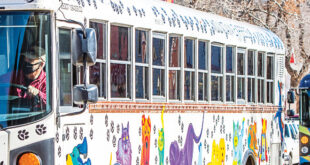How to pay for a more robust composting program
By Mark Reaman
Despite the addition of curbside composting being an option in the new Waste Management (WM) contract for Crested Butte residential trash customers, the town council pulled back the reins on the idea at its January 6 meeting and asked staff to explore more solid numbers on costs and explore how to better encourage voluntary composting.
The council did show support for a so-called Save as You Throw (SAYT) waste program that could include a subsidy for people willing to downsize their trash bin from 96 gallons to either 64 or 32 gallons. Trash bills would be more expensive for residents using 96-gallon bins than for those using the smaller containers. The idea is that then people would be more cognizant of what they toss as trash instead of recycling or composting. While the Waste Management prices between the monthly cost of the largest and smallest bin is less than $5 a month, council would look to make the gap wider to better incentivize the use of the smaller bins. Those costs have yet to be determined.
Waste Management public sector solutions manager Curtis Gardner told the council the company’s cost differential is based on real costs, most of which are fixed. The price of gas and salary of the driver don’t change whether WM is picking up a 96-gallon bin or a 32-gallon bin.
As for composting, the town currently works with Elements Mountain Compost that runs the voluntary residential drop-off program that is subsidized by the towns of Crested Butte and Mt. Crested Butte. For $17/month locals can drop off composting at any time near the Visitor’s Center which is then picked up by Elements weekly and driven to Salida for composting. The program currently has 54 active subscriptions and Crested Butte sustainability coordinator Dannah Leeman informed the council that 250 residential memberships are needed to eliminate the town subsidy for the program. She is an advocate for composting, noting that it reduces carbon and greenhouse gas emissions.
“We have a really big contract in front of us right now with the renewal of the five-year Waste Management contract,” she said at the council meeting explaining that WM was open to partnering with Elements to facilitate composting services and the contract could “bundle” trash, recycling and composting services.
She said the initial WM numbers showed if the council wanted to support a voluntary curbside composting program it would cost participants $45/month if 80 households signed up. If council wanted to make curbside composting for all town households part of the contract, 845 homes would be provided the service and the numbers showed it would add an additional $39/month to the trash bill. The staff suggested that increase could be subsidized and lowered in part through people who choose to use the large 96-gallon trash bins in a SAYT program and pay a higher trash rate.
“We first need to gain some momentum with the voluntary program to get people into composting,” said councilmember John O’Neal. “We need more education before forcing behavioral change. It seems more people would do it if there was curbside composting pick-up and that is something to consider on the voluntary basis.”
“I am super interested in the SAYT incentive program,” said councilmember Anna Fenerty. “The composting element doesn’t seem quite ready for the next step. Also, how would the people that have already been composting for years be impacted?”
Councilmember Gabi Prochaska made the argument for the town to subsidize composting more than it currently does and explained that in Europe, it is expensive to throw trash away and that works as an incentive for people to compost and recycle at a higher rate than Americans.
“I would like to see the real numbers in a proposal to subsidize small trash bins and see how that could incentivize composting,” added councilmember Beth Goldstone.
Mayor Ian Billick summarized that while there was support for the SAYT program, the council didn’t appear ready to include mandatory composting as part of the contract.
He admitted that the proposal to include the curbside composting as part of the contract “raised my hackles when I saw it. That would be an increase of $400,000 a year that the citizens would pay, or we would have to pick up as a subsidy from the town budget. It would cost me an extra $1,000 a year which is a real impact. If town wants to subsidize it all then we would take it out of the general fund and what would we give up in return? It looks to me like a ‘feel good’ program since we have never had composting as one of our priorities to deal with carbon reduction.”
Prochaska reiterated that a subsidy could be funded through the SAYT program “making it more expensive to throw trash in your bin, which is the incentive to generate less trash.”
Leeman said she would bring more solid numbers back to the council to consider.
 The Crested Butte News Serving the Gunnison Valley since 1999
The Crested Butte News Serving the Gunnison Valley since 1999


